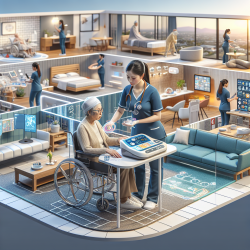The landscape of home care services is evolving rapidly as the number of individuals requiring long-term healthcare continues to rise. With this increase comes the pressing need to ensure patient safety and high-quality care in the comfort of patients' homes. A recent study titled ‘We just have to make it work’: a qualitative study on assistant nurses’ experiences of patient safety performance in home care services using forum play scenarios sheds light on how assistant nurses (ANs) adapt their practices to meet these challenges effectively.
Understanding the Research
The study utilized a qualitative approach, employing forum play scenarios followed by group interviews to explore ANs' adaptive responses in home care settings. Conducted in two municipalities in southern Sweden, the research involved 24 assistant nurses and three managers from municipal home care services. The findings revealed that ANs often make autonomous decisions to accommodate the unique needs of each patient, ensuring safety while promoting independent living.
Key Findings and Implications for Practice
- Adaptive Responses: ANs frequently adjust their routines based on the specific needs of patients. This includes altering schedules and prioritizing tasks to provide personalized care.
- Autonomous Decision-Making: The study highlights the importance of empowering ANs to make independent decisions that expand their room for maneuverability, ultimately benefiting patient care.
- Interprofessional Collaboration: Effective information transfer and knowledge acquisition across disciplines are crucial for maintaining patient safety. ANs often take the initiative to ensure seamless communication between different healthcare providers.
- Proactive Leadership: The research suggests that proactive leadership characterized by mutual trust and support for decision-making is essential. Managers should foster an environment where ANs feel confident in their ability to make informed decisions.
Implementing Research Outcomes
Practitioners can enhance their skills by implementing the outcomes of this research in several ways:
- Encourage Adaptive Practices: Foster an environment where ANs feel empowered to adapt their practices based on patient needs. This flexibility can lead to improved patient outcomes and satisfaction.
- Promote Interprofessional Collaboration: Facilitate regular communication between different healthcare providers involved in a patient's care. This ensures that all parties are informed and can work together effectively.
- Support Proactive Leadership: Develop leadership strategies that emphasize trust and support for ANs. Encourage open dialogue and provide resources that enable ANs to make informed decisions confidently.
- Pursue Further Research: Engage in ongoing research to explore new methods and strategies for improving patient safety in home care settings. This continuous learning approach will help practitioners stay informed about best practices.
The Role of Forum Play Scenarios
The use of forum play scenarios in this study provided valuable insights into the complexities of providing safe home care services. This drama-based method allowed participants to visualize problems and reflect on their actions, leading to a deeper understanding of the challenges faced by ANs. Practitioners can consider incorporating similar methods into training programs to enhance problem-solving skills and foster a culture of continuous improvement.
A Call to Action
The findings from this study underscore the critical role that ANs play in ensuring patient safety within home care settings. By embracing adaptive practices, promoting collaboration, supporting proactive leadership, and engaging in further research, practitioners can significantly enhance the quality of care provided to patients at home.
To read the original research paper, please follow this link: ‘We just have to make it work’: a qualitative study on assistant nurses’ experiences of patient safety performance in home care services using forum play scenarios.










